- Tel: 1(345) 640 7827
- [email protected]
- 94 Solaris Avenue Camana Bay
Menu
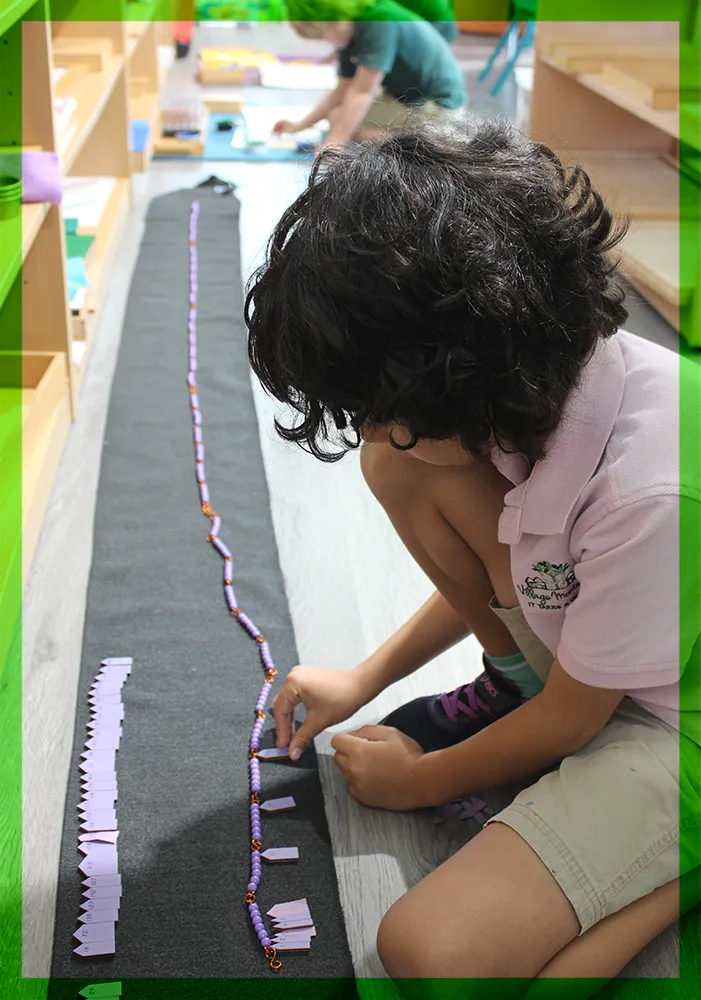
Montessori is an educational philosophy and method developed by Dr. Maria Montessori, an Italian physician and educator, in the early 20th century. The Montessori philosophy and approach to educating children is a holistic method to each child’s individual development. With this in mind, we prepare an environment that fosters independence, concentration, and self-confidence. Our classroom offers children the experience of working with specialized materials developed by Dr. Maria Montessori that encourages the overall development of the child. The materials are designed to provide successful learning experiences while developing a love and desire to learn from within. The children can choose materials freely, within the limits of their abilities, providing a personal developmental program for each child. The Montessori Method allows children to learn at their own pace according to their own capabilities in a non-competitive environment. The children experience the excitement of learning through their independent daily activities which help to cultivate the child’s own natural desire to learn, thus beginning the lifelong process of education.
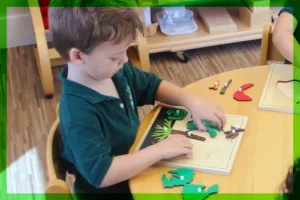
While our curriculum is based on the Montessori Framework, we do meet the U.K. Curriculum Standards and Objectives as per the Cayman Islands Ministry of Education. All of our classrooms are are multi-age classrooms that are team taught.
The Casa and Elementary programmes are based on a three-year work cycle and the children ages for transition are based on the 01 September cutoff date as followed by the Government and most private schools on island.
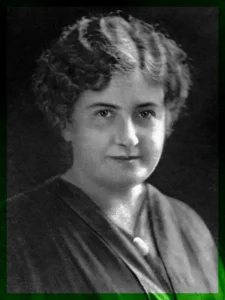
Born in Chiaravalle (Ancona), Italy, in 1870, Dr. Maria Montessori lived a life of great achievement. Her life was a beautiful balance of the spiritual and scientific. Throughout her life she was an educator, physician, scientist, philosopher, feminist and humanitarian. Maria became the first female doctor in Italy.
Throughout her time as a doctor, she worked with children in a variety of settings and noticed that they were starving for experience and began to think about what she could do to help. In 1901 she went back to school to study the human mind instead of the body. It was in 1906 that she accepted the challenge to work with a group of sixty young children from working families. This is where she developed her educational methods that were so successful that even learning disabled children began to pass exams suited for “normal children”.
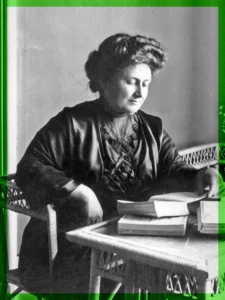
In 1907 Dr. Montessori had established the first Casa dei Bambini (Children’s House) in Rome. Dr. Montessori began to notice that children would absorb knowledge almost effortlessly from their surroundings. This is what inspired her to put forth a new outlook on education. She observed that children are sensorial learners and therefore developed her method and materials in order to support this. Dr. Montessori discovered that these children were fascinated with the puzzles and devices she developed and they spent long periods of time focused and attentive. She succeeded in creating materials that capture a child’s attention and therefore assisting in the process of concentration. Guided by her discovery, she noticed that the children began to teach themselves. Therefore she designed a “Prepared Environment” in which children could freely choose from a number of developmentally appropriate activities. To her amazement, 3 and 4 year olds were very happy to learn simple skills like sweeping folding and pouring. In Dr. Montessori’s care, the children learned to read on their own, choose work instead of play, loved order and silence and developed social skills in which they worked together instead of competing against one another.
Now a century after Dr. Maria Montessori’s first Casa de Bambini in Rome, Montessori education is found all over the world spanning ages from birth to adolescence. Village Montessori is committed to the principles of Dr. Montessori and like her, we strive to nurture each child’s individuality and a love of learning.
~ Dr. Maria Montessori
Montessori places the child at the center of the educational experience. It acknowledges and nurtures each child’s individual interests, strengths, and pace of learning, promoting a deep and meaningful engagement with the curriculum.
The Montessori method uses specially designed, hands-on materials to help children understand abstract concepts through concrete experiences. This approach is highly effective in facilitating a deeper understanding of subjects.
Montessori classrooms promote independence and self-discipline. Children are encouraged to make choices, manage their time, and take responsibility for their learning, helping them develop essential life skills.
In Montessori, children often learn in mixed-age classrooms, which encourage cooperation, mentoring, and the development of social skills. This environment closely mirrors the real world and prepares them for diverse social situations.
Montessori values the development of the whole child, not just their academic abilities. This includes emotional, social, and physical development, ensuring well-rounded individuals.
Montessori classrooms aim to make learning an enjoyable and intrinsically motivating experience, instilling a love for learning that lasts a lifetime.
The Montessori philosophy places a strong emphasis on respect for oneself, others, and the environment. It fosters a sense of peace, both internally and in the classroom.
Teachers adapt the curriculum to meet each child’s needs, providing advanced work for those who excel and additional support for those who require it.
Practical life skills are integrated into the curriculum, ensuring that children gain the skills they need to navigate the challenges of everyday life.
Montessori graduates often excel academically and socially. They tend to be self-motivated, adaptable, and well-prepared for future education and life challenges.
Education is not something which the teacher does, but a natural process that develops spontaneously in the human being.
~ Dr. Maria Montessori
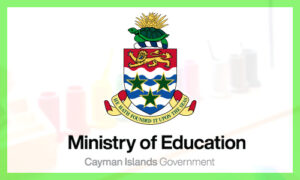 The Cayman Islands Early Years Curriculum Framework was developed by the Ministry of Education’s Early Childhood Care and Education Unit in response to the need within our community for a guiding document that would ensure consistent provision within the early years. Our school incorporates the learning outcomes of this curriculum framework which includes key focus areas such as Exploration, Respect, Communication and Well-Being at the Toddler and Casa (Young Child) levels.
The Cayman Islands Early Years Curriculum Framework was developed by the Ministry of Education’s Early Childhood Care and Education Unit in response to the need within our community for a guiding document that would ensure consistent provision within the early years. Our school incorporates the learning outcomes of this curriculum framework which includes key focus areas such as Exploration, Respect, Communication and Well-Being at the Toddler and Casa (Young Child) levels.
The new Curriculum was adapted from the English National Curriculum 2014 and has been designed to incorporate modules focused on Caymanian history, geography, and social studies. The curriculum is intended to allow students to become engaged, empowered, and principled citizens.
The Montessori Method was developed with the belief that young children absorb all that is around them. We have planned a stimulating curriculum to facilitate the children in their quest for knowledge and independence.
The Montessori curriculum covers four classroom areas, Practical Life, Sensorial, Language and Math. Specialized materials and lessons are provided in each of the areas and assist with the development of the whole child.
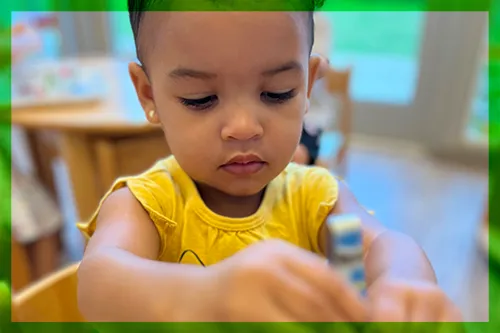
Materials and lessons in this area serve to help the child adapt to the environment. Through these lessons’ children build independence, concentration, problem solving skills and both fine and gross motor movements. Lessons in grace and courtesy assist the child in developing control of movement and consideration for others.
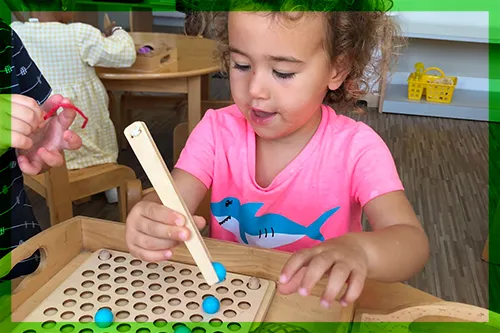
Materials are provided for the child as he/she learns to compare, contrast, and discriminate different sense impressions. Children enjoy the freedom to explore with the material and therefore create sensorial impressions based on their individual needs. Areas that are explored are colours, shapes, textures, gradations, size, sound, smell and taste, rhythm, volume.
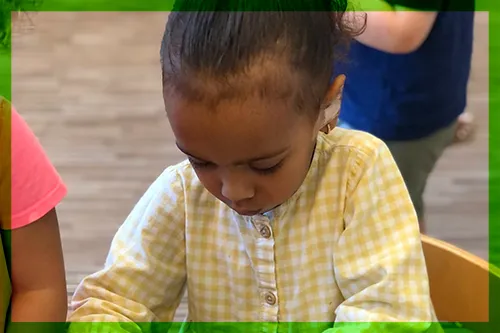
Maria Montessori recognized that language is not something that is taught by another, but that it is something created by the children themselves. The language program in a Montessori environment begins by enriching and expanding the child’s vocabulary through conversation, stories, songs, poems, and classified picture cards. Next, the child is introduced to the phonetic sounds of our alphabet through use of sound games. Along with the sounds, the child is introduced to the accompanying symbolic representation in the form of sandpaper letters which the child will continue to build on in the Casa classroom.
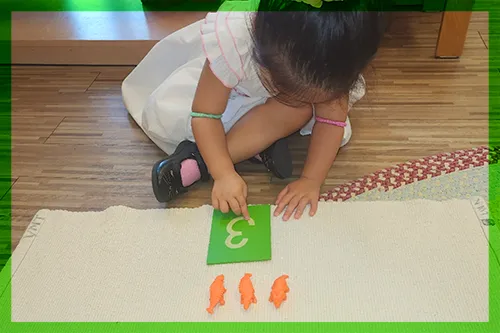
Mathematics can simply be defined as an abstract science of number, quantity, and space. For a child to understand the concept of mathematics, he or she must first understand quantity. The toddler materials found in this classroom area allow the child to freely explore quantity and numbers in concrete form.
We aim to provide positive encouragement and activities that foster growth and development in a nurturing environment. The children can take their own time to be observers before becoming participants, and they will have freedom to repeat activities.
In accordance with Montessori philosophy, the adults present are there to allow the children to work as independently as possible. Assistance is available when needed.
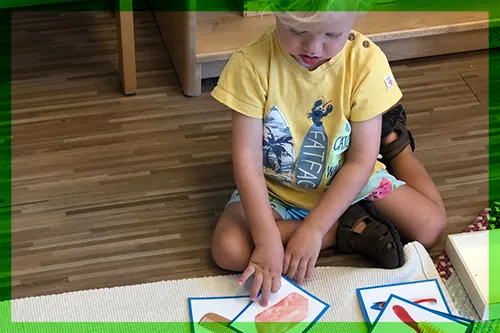
All children will have the freedom to explore their imaginations in a variety of mediums used for expression. The importance of the process is stressed rather than the end product. Arts & Crafts are traditionally done at the child’s own will during classroom time.
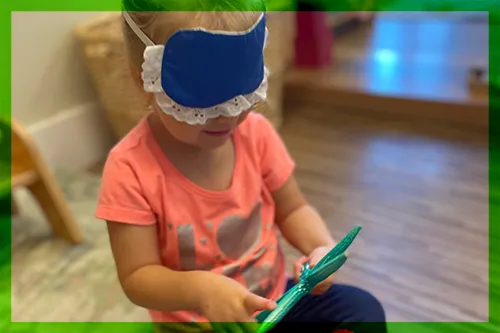
We offer a specialized music enrichment program for all our students. Classes are offered on a weekly basis and include singing, dancing, and instrument exploration.
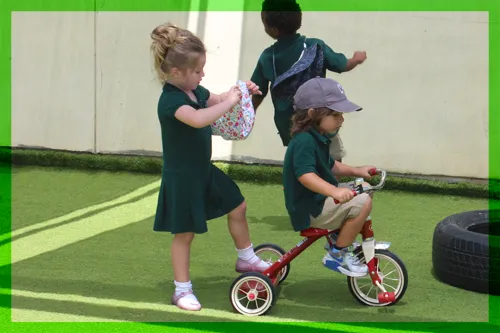
Our playground offers a beautiful, natural, and shaded play space where children are free to explore, run, and play. In addition to free play, children have the opportunity to engage in activities such as playing on the trampoline, races and water play just to name a few. The children will be outside for a portion of each day except during poor weather conditions. As we are based in Camana Bay the children have the opportunity to explore the island, play in fountains, take nature walks and enjoying the beauty of the entire Camana Bay.
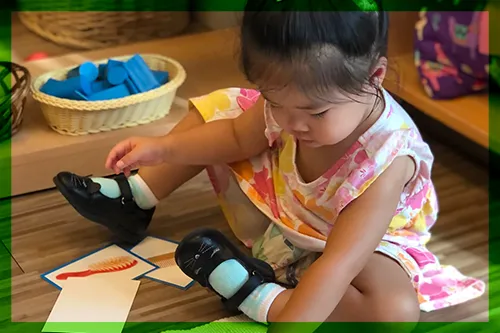
When the children are showing signs of readiness, we will encourage our toddlers to wear underwear during school hours and during this time of potty-training transition extra clothes and underwear will be required at school.
All children in diapers/nappies are changed and encouraged to use the toilet every day. Please keep in mind we change all wet nappies standing up and encourage the children to help with the process as much as they can. Those children who are no longer in diapers/nappies are reminded to use the bathroom regularly throughout the day.
If your child wears diapers/nappies, you will need to provide an adequate supply throughout the year including wipes.
Our Montessori curriculum is designed to teach children independence, fine/gross motor skills, practical life skills, language, mathematics, geography, and culture. We aim to provide positive encouragement and activities that foster growth and development in a nurturing environment. The children are welcome to observe before participating and are given the freedom to repeat activities as often as they choose. In accordance with Montessori philosophy, the adults present are there to allow the children to work as independently as possible. Assistance is available when needed.
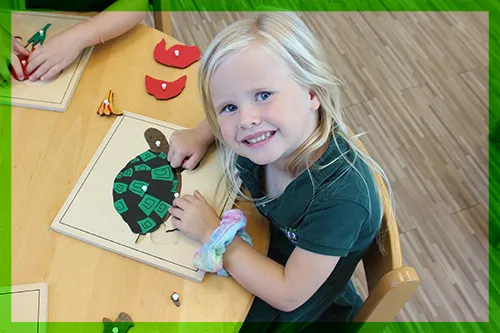
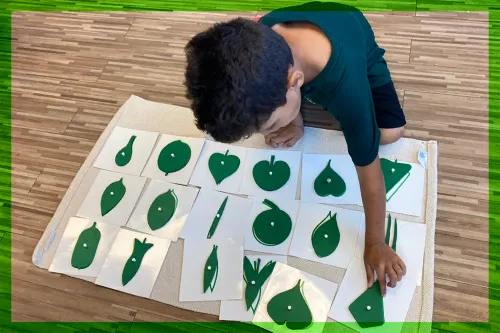
Practical life activities are tasks of daily living. When children come into the world, their first function is to adapt to their environment so that they can become an active member within it. The daily jobs undertaken by adults in the home environment (i.e., establishing, maintain and embellishing the living environment; the care of others and the care of self) are fascinating to the child because they are aesthetic, logical and understandable. If the child is welcome and well received, the home environment will become a sense of endless attraction to them and the urge to independently partake in the daily activities will be strong. The activities found in this classroom area include lessons in care of self (dressing, grooming, etc.), care of the indoor and outdoor environment (sweeping, washing up, dusting, polishing, raking leaves etc.) and grace and courtesy (respect for self, others, and the environment). All of the activities found in this area help to develop concentration, independence, control and co-ordination of movement, orderly work habits and logical sequential thinking.
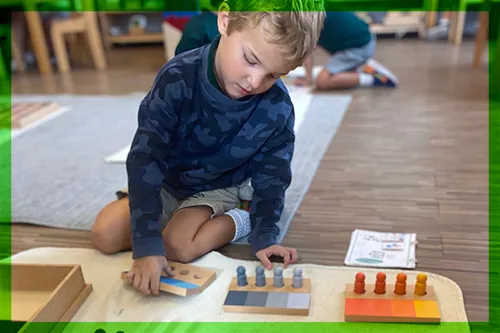
Aristotle firmly believed and viewed the senses as gateways to intelligence. Dr. Montessori agreed with Aristotle and therefore developed these specialized materials for her schools. The main purposes of the sensorial materials are to help the child to classify and refine their sense perceptions. They invite the child to sort things by size, shape, colour, touch, sound, temperature, and weight. They also allow the child to grade from dark to light and from small to large helping them to classify sensorial impressions in an organized and scientific manner. The activities in this area allow for individual work and for repetition and all have a built-in control of error. Because of this built-in control of error, the children acquire the habit of working independently, unafraid of making mistakes, becoming aware of the fact that errors are essential to the process of learning.
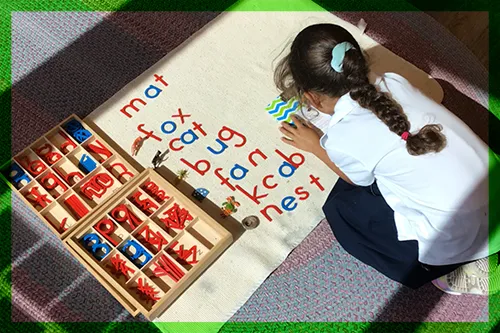
Maria Montessori recognized that language is not something that is taught by another, but that it is something created by the children themselves. The language program in a Montessori environment begins by enriching and expanding the child’s vocabulary through conversation, stories, songs, poems, and classified cards. Next, the child is introduced to the phonetic sounds of our alphabet through use of sound games. Along with the sounds, the child is introduced to the accompanying symbolic representation in the form of sandpaper letters. When children can associate the sound with the symbol or letter, writing naturally occurs followed shortly by reading. The child’s hand is also prepared for writing through use of our practical life and sensorial materials as well as by using the metal inset activities and chalkboards.
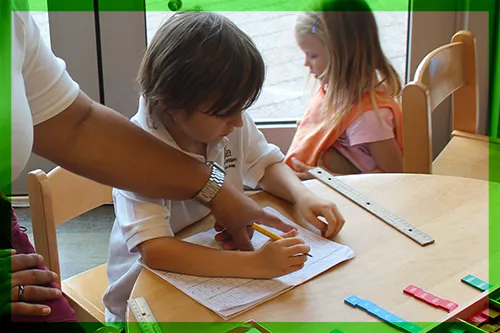
Mathematics can simply be defined as an abstract science of number, quantity, and space. For a child to understand the concept of mathematics, he or she must first understand quantity. The materials found in this classroom area are uniquely designed to make the abstract concept of mathematics appear concrete.
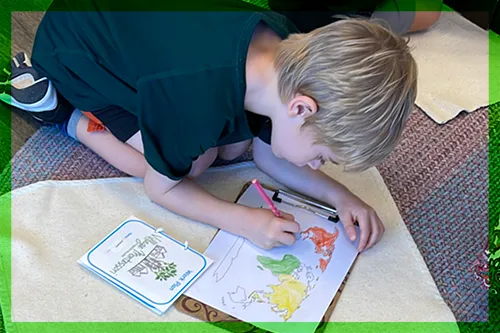
These areas are presented as extensions of the language, sensorial and practical life areas and will spontaneously be integrated into our program. Children will gain cultural awareness by exploring art, cuisine, music, language, and traditions from around the world. This will help to initiate respect and admiration towards other people and cultures.
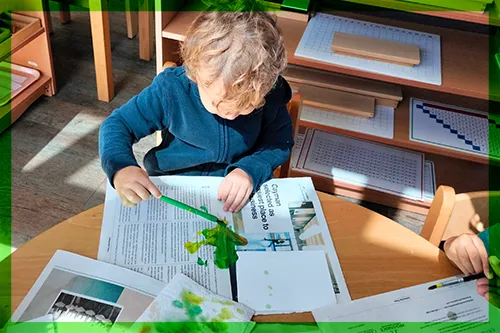
The children will have the freedom to explore their imaginations in a variety of mediums used for expression. The importance of the process is stressed rather than the end product. We will follow an Art program called “Sharing Art with Children in the Montessori Way” created by a Montessori teacher.
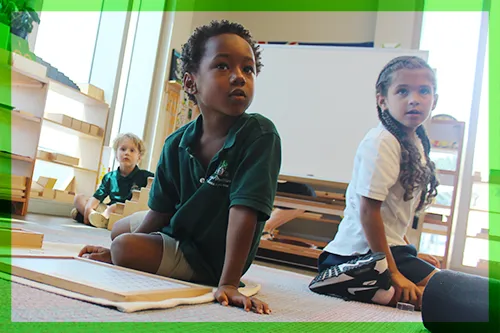
An introduction to Spanish will be taught in each class and will be integrated twice weekly during the circle time routine of each classroom. This is a time for the classroom community to come together and is also a time when the teacher will review concepts in Spanish such as calendar, time, weather, songs, poems, and related language to the classrooms current theme. Because children have an innate ability to acquire multiple languages, it is a perfect time to introduce Spanish. Their natural curiosity and ability to imitate sounds allows them to develop a basic, usable command of the Spanish language. In addition, studying another language enables intellectual flexibility, enhances problem-solving skills, heightens creativity, and leads to higher performance in other academic areas.
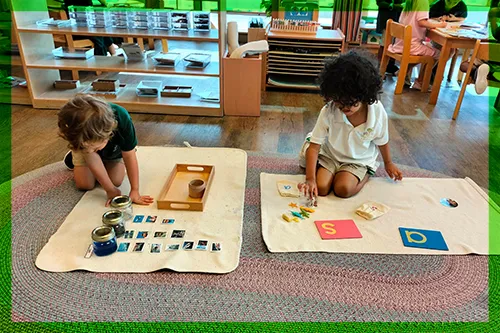
Social and emotional learning (SEL) enhances students’ capacity to integrate skills, attitudes, and behaviours to deal effectively and ethically with daily tasks and challenges. SEL’s integrated framework promotes intrapersonal, interpersonal, and cognitive competence. There are five core competencies: self-awareness, self-management, social awareness, relationship skills and responsible decision making. At Village Montessori we utilize Growth Mindset; In a growth mindset, people believe that their most basic abilities can be developed through dedication and hard work—brains and talent are just the starting point. This view creates a love of learning and a resilience that is essential for great accomplishment.
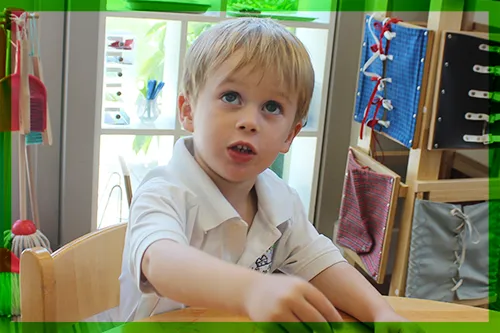
In music we offer the younger children the opportunity for choral expression and music and movement and for the elementary children have the added benefit of getting to explore an instrument.
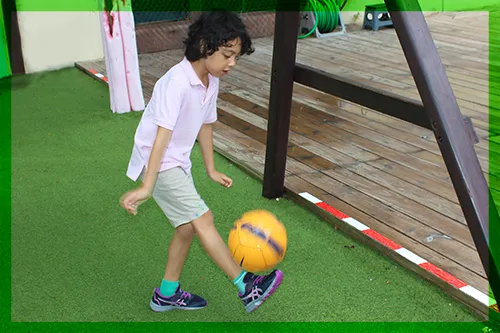
In PE children will participate in activities that will utilize their gross motor skills, balance and understanding of team play.

ICT is the study of Information and communication technologies. Now, more than ever, knowledge and experience with computers and their related technologies is an important part of daily life. In this course we focus on a few different aspects. The primary focus is introducing Coding to students at a young age. This helps not only build a strong computing foundation, but also develops problem solving and pattern recognition skills. We introduce these concepts using a visual “Block” based language that is simple for kids of all ages to understand. During the year we will also explore physical aspects like the hardware of a computer and being able to identify some key components. We will look at various multimedia applications from animation software to photo and video editing. Students will be guided through proper typing skills and encouraged to practice whenever they can. The goals of this course are to develop skills and abilities that will make using computers easier, all while having fun!!
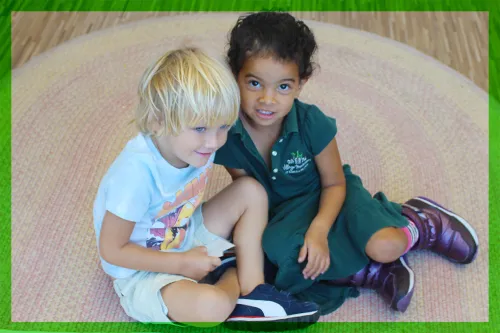
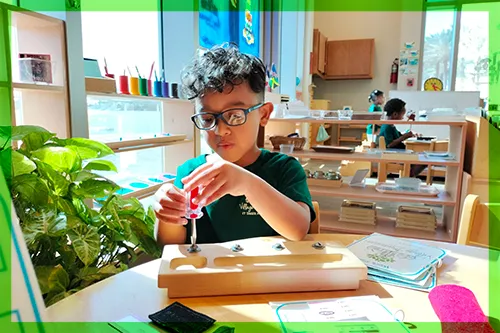
Themes are incorporated throughout the school year and link different disciplines so that students will develop “big” and important ideas. Educational researchers are learning that students are better served when provided opportunities to develop deep knowledge about a few “big ideas” rather than a superficial knowledge of a broader range of ideas and information. The teachers choose themes that are developmentally appropriate and socially engaging for students. Themes will vary in nature and scope and will be motivating to students and relevant to their lives.
Developing themes through a variety of activities over time has particular benefits for many students with disabilities whose experiences may be limited. For students with communication needs, themes enable the entire class to develop a common content vocabulary that they can use to deepen their interactions. As our academic year in the classroom unfolds, you will see how they weave themes into different curricular activities throughout the day.
The Lower and Upper Elementary Classrooms are a mixed age environment with students between the ages of 6 to 9 years old. Children at the elementary level no longer learn primarily by absorbing information but by direct application. They are eager to understand and are more conscious of the world around them. Specifically, they are no longer interested primarily in facts (what and when) but in questions (why and how). Children at the elementary level are entering what Dr. Montessori referred to as the second plane of development. The children flourish during this time as individuals and as contributing members of society.
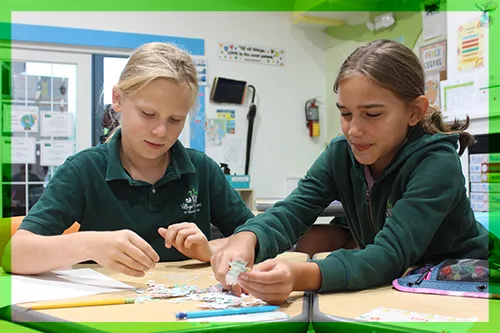
The curriculum of an Elementary Classroom is designed to foster a tremendous imagination, an aptitude for the abstract, a strong sense of morality and justice, and strong need for peer relationships. Individually paced academic progress allows students to explore their interests along with acquiring the mastery of basic skills and knowledge. The Village Montessori learning environment reflects activities that provide deeper educational experiences in the areas of mathematics (including geometry and algebra), science and technology, literature, history, botany, zoology, geography, civics, economics, anthropology, and areas of art, music, foreign language, physical education and technology.
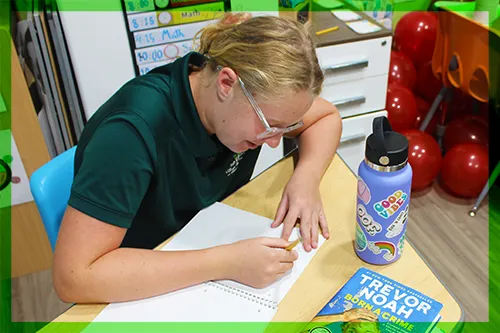
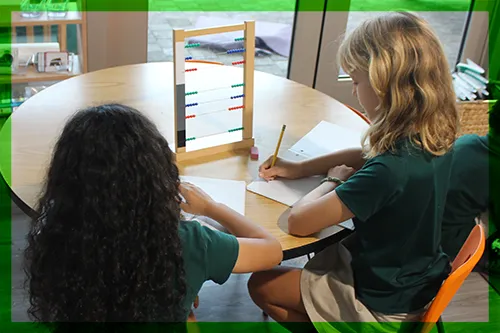
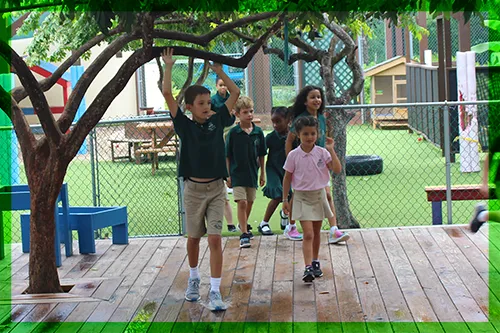
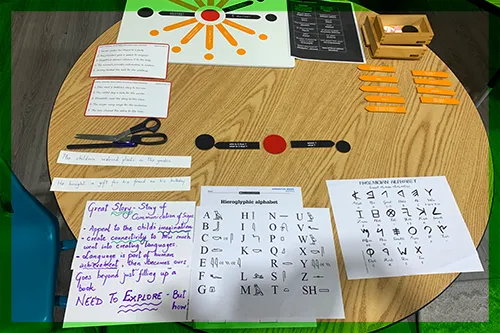
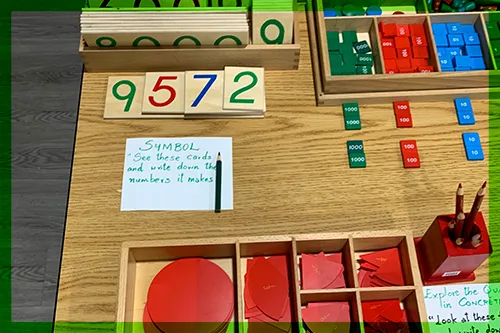
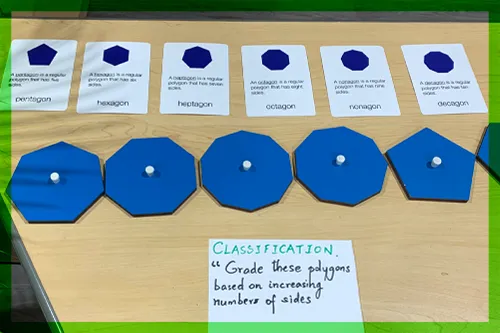
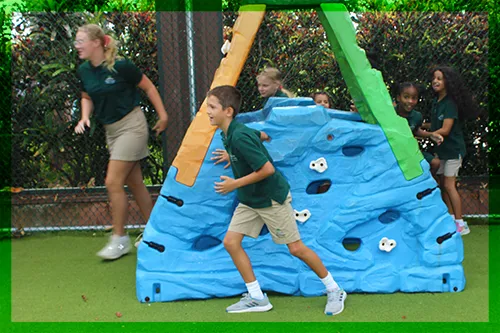
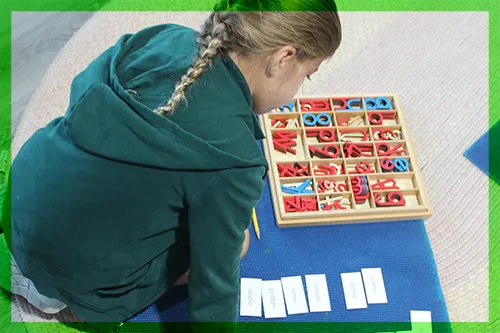
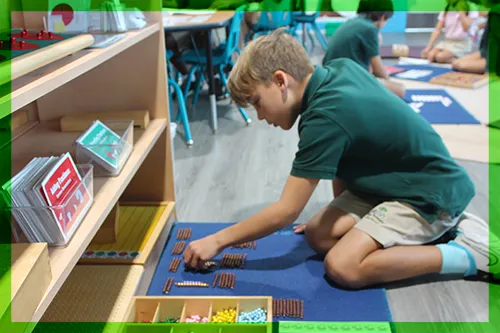
Children can typically start Montessori programs as early as 18 months to 3 years old, depending on the school. Montessori programs often span from infancy through elementary and even into middle school.
No, Montessori education is for all children. It is designed to meet each child’s individual needs and pace of learning, making it suitable for a wide range of abilities and learning styles.
Montessori schools often have mixed-age classrooms instead of traditional grades. Homework is minimal in the early years but may increase in upper elementary and middle school Montessori programs.
In a Montessori classroom, the teacher is often referred to as a “guide.” Their role is to observe and support each child’s learning, provide materials, and offer guidance as needed, allowing students to take the lead in their education.
Montessori programs have a structured curriculum that covers subjects like mathematics, language, practical life skills, and cultural studies. However, the curriculum is adaptable to individual student needs.
Montessori classrooms often have mixed-age groups, which encourage cooperation, peer teaching, and social development. Children learn to work together, resolve conflicts, and respect one another.
Montessori education is recognized and respected by many traditional schools and universities. Montessori students often transition well into various educational settings.
Yes, Montessori principles can be applied at home. You can create a prepared environment, provide hands-on learning materials, and encourage independence and responsibility in your child’s daily life.
These FAQs provide a brief overview of Montessori education, but it’s important to conduct further research and reach out to us for more specific information about our programs at Village Montessori.
A community site geared towards Montessori parents with relevant blogs, video and other media about Montessori education and parenting.
Author: Cathie Perolman
A Handbook for 3-6 Teachers and Homeschoolers : Assessing and Assisting Children with Exceptionalities Ages 3-6
View our classrooms and learn more about Village Montessori education.
After your tour you’re invited to apply for your child.
Meet other new parents, connect with us and get acquainted with our Village.
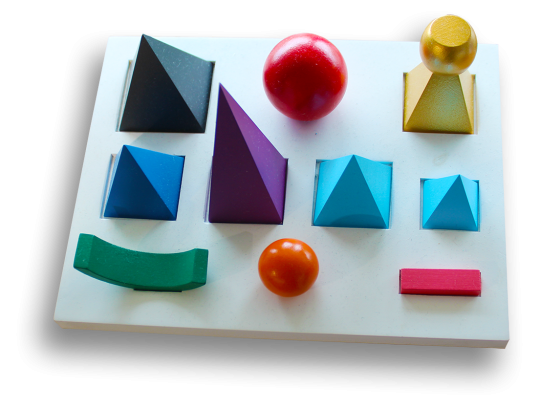
This is an opportunity to witness firsthand the nurturing and child-centered approach to education that sets Montessori apart. It’s a chance to see how the Montessori approach encourages children to become independent, confident learners who love to explore and discover.
Village Montessori
94 Solaris Avenue, Camana Bay, Grand Cayman.
ALL TOURS START AT 3:30 PM.